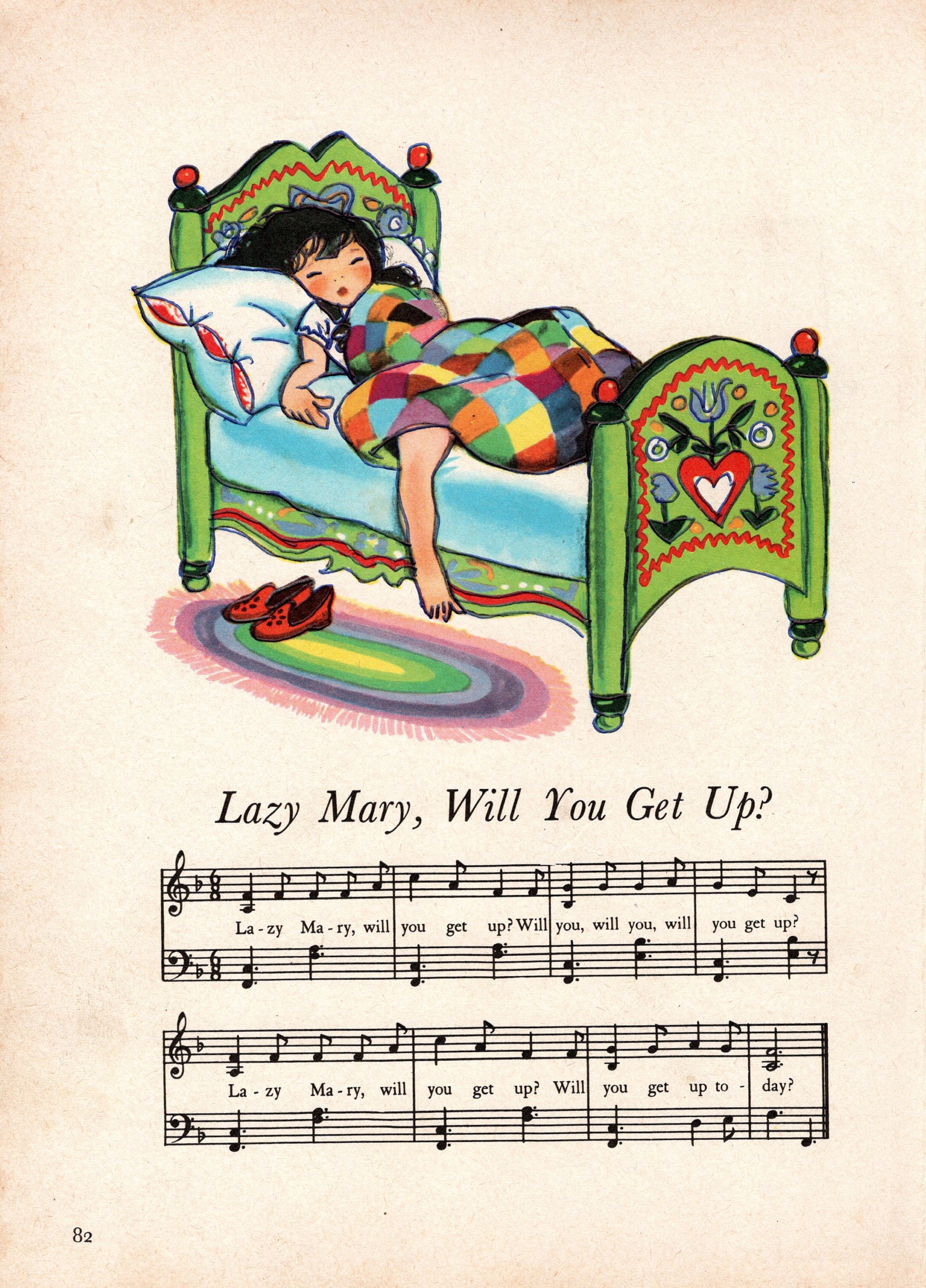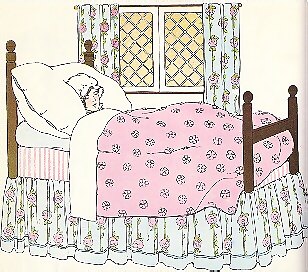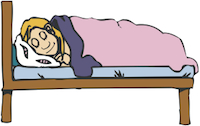It’s been so cold the last couple of days with frosts and
snow down in the south. I have been quite tired too and yesterday I really
didn’t want to get out of the warmth of my bed. I have suffered a little of
depression in the past and so I know that sometimes I have to really shut out
the black dog and talk myself into getting out of bed.
This morning the song Lazy Mary came to mind.
Lazy Mary, will you get up,
Lazy Mary, will you get up,
So early in the morning?
No, dear Mother, I won't get up,
I won't get up, I won't get up.
No, dear Mother, I won't get up,
So early in the morning.
Lazy Mary, will you get up,
Will you get up, will you get up?
Lazy Mary, will you get up,
So early in the morning?
What'll you give me for my breakfast,
What'll you give me for my breakfast,
So early in the morning?
A little bowl of bread and milk,
Of bread and milk, of bread and milk.
A little bowl of bread and milk,
So early in the morning.
Then, dear Mother, I won't get up,
I won't get up, I won't get up.
Then, dear Mother, I won't get up,
So early in the morning.
A nice young man with rosy cheeks,
With rosy cheeks, with rosy cheeks!
A nice young man with rosy cheeks,
So early in the morning.
Then, dear Mother, I will get up,
I will get up, I will get up.
Then, dear Mother, I will get up,
So early in the morning.
As with the
nursery rhymes I know, I am intrigued to know their origins so wondered where
this one came from.
After reading the books listed on the literate housewife website for Philippa Gregory’s Tudor Novels I recalled the life of
Queen Mary and thought the song had been sung about her.
She married very late at 38 although numerous suitors were
sort for the good of England and the throne but none were carried through until
Prince Philip of Spain. He was never in England for long and this upset Mary.
She had two false pregnancies and never gave birth to a child dying at the age
of 42. Mary was weak and ill from May 1558 and died at St. James's
Palace during an influenza epidemic. She was in pain, possibly from ovarian
cysts or uterine cancer.
 So I naturally assumed that this song was about Mary not
wanting to get out of bed either through illness or the lack of a husband. The
prospect of “A nice young man with rosy cheeks,” was a sure motive for her to
‘get up’
So I naturally assumed that this song was about Mary not
wanting to get out of bed either through illness or the lack of a husband. The
prospect of “A nice young man with rosy cheeks,” was a sure motive for her to
‘get up’
On searching the web I could only find references to a song
from the early 1900’s. It is related to a song called “She Won’t Get Up,” by
Randolph which is more related to just wanting to get the girl out of bed. In
an Alabama version they try to get her up first for breakfast, then for dinner
and finally for supper. The rewards are different in the two versions.
Lazy Mary, will you get up, Will you get up this morning.
What will you give me for my breakfast? for my breakfast,
for my breakfast?
What will you give me for my breakfast, if I get up this morning.
Ham and eggs (spoken)
No, no, mother, I won't get up, I won't get up, I won't get
up.
No no, mother, I won't get up, I won't get up this morning.
Lazy Mary, will you get up? Will you get up, will you get
up?
Lazy Mary, will you get up, Will you get up today?
What will you give me for my dinner? for my dinner, for my dinner?
What will you give me for my dinner, if I get up today.
Chicken pie (spoken)
No, no, mother, I won't get up, I won't get up, I won't get
up.
No no, mother, I won't get up, I won't get up today.
Lazy Mary, will you get up? Will you get up, will you get
up?
Lazy Mary, will you get up, Will you get up this evening?
What will you give me for my supper? for my supper, for my
supper?
What will you give me for my supper, if I get up this
evening?
A nice young man with red rosy cheeks (spoken)
Yes, dear Mother, I will get up, I will get up, I will get
up.
Yes, dear Mother, I will get up, I will get up this evening.
Source: Journal of American Folklore, Vol. 72-73 (1915)
It is sung to the tune "The Mulberry Bush." A
melodic relationship with "Marry-Ma-Tansa" is suggested. "Lazy Mary" was collected by Maude
Minish Sutton from Miss Nell Searcy, Chimmney Rock, North Carolina, ca. 1927, in the "Game and Rhymes” section (Ed Paul G. Brewerster) of the Frank C.
Brown Collection of North Carolina Folklore Vol. 5, "The Music of the Folk
Songs," (Ed. J. P. Schinhan) Duke University Press, Durham, North
Caroliina. The words to this song are provided by Iona and Peter Opie's The
Singing Game {Oxford University Press, 1985} "Play-Pary, Courting, and
Kissing Games and Songs."
In this game Lazy Mary lies down in the centre of a ring
with her mother kneeling beside her, attempting to persuade her to get up. Butter
and bread is not much of an inducement, but a young man with rosy checks is
quite a different matter. Again, it is a pairing game with a kiss to seal the
getting up.
Another of the game song's performance is described as:
"A ring with mother and daughter in the centre, the
daughter with closed eyes. The mother advances and retreats. Not surprisingly
the game does not appear in any collections aimed at children...Crofton found
it jumbled up with other games in Dukinfield, Chesire, c1875. The daughter sits
with 'wi' pinny up to her face' in the ring and asked
If I get up
today?
Tea and toast
to your breakfast
If you get up
today.
No, Mother, no!
I winna get up,
I winna get up
today.
And in still another: All the children sing the first verse,
while dancing around the child chosen to be "Lazy Mary." Then they
all sing the second verse together.
Lazy Mary, will you get up,
Will you get up, will you get up?
Lazy Mary, will you get up,
Will you get up today?
No, no Mother, I won’t get up,
I won’t get up, I won’t get up.
No, no Mother, I won’t get up,
I won’t get up today.
Source: Newell, Games and Songs of American Children (1903)
It had become entangled with 'The Keys of Heaven' in Devon
and Somerset by the 1920s, but by that time was fully alive as an independent
game in the United States and Dublin, where it was 'still very popular' in
1975."
Today was not a good start. I was woken by my eldest (just
as well she rung) at 8.15am and after a chat I got out of bed and a quick ready
for work. However, while in the shower I was beginning to feel quite unwell.
After thinking of the song again I thought no wonder she wasn’t keen to get out
of bed if she felt like I did and no tempting food would encourage her. In fact
my breakfast and morning cuppa ended up down the drain so for me I wouldn’t be
getting out of bed for food... but maybe a nice young man!
Well not really, but I could well understand!
Well not really, but I could well understand!
See also Eloise Hubbard Linscott, Folk Songs of Old New
England (Macmillan, 1939,).
William Wells Newell, Games and Songs of American Children
(1884; rpt. Clearfield, 1992)
American Folk Poetry - An Anthology







No comments :
Post a Comment